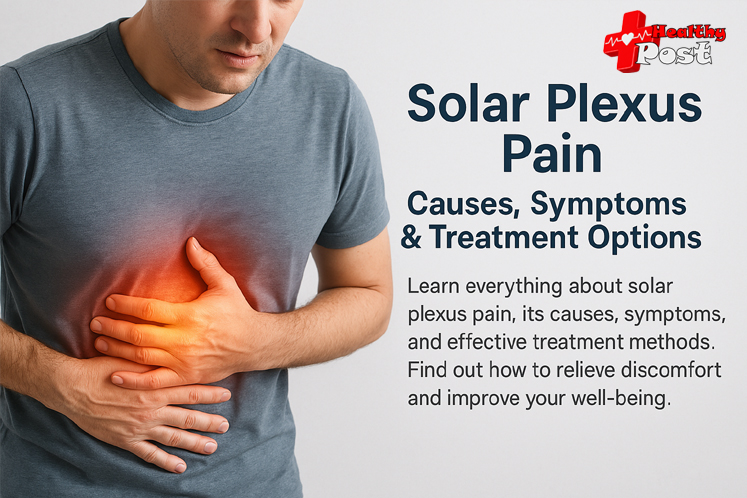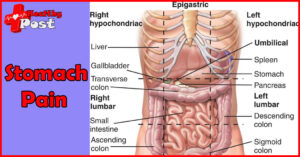
Let’s know full details about solar plexus pain
The solar plexus is a large concentration of nerve fibers, processes, and nodes in the area where the chest meets the upper abdomen. The number of nerve processes in the solar plexus is so great that scientists call it the abdominal brain. If the solar plexus hurts (Solar Plexus Pain), it indicates a problem in the nerve processes themselves, injuries or diseases of the internal organs.
Localization of pain sensations
Most often, people experience pain above or below the solar plexus. If it hurts under the solar plexus, the problem may be related to a malfunction of the genitourinary system or intestines.
Pain above the solar plexus may indicate problems in the digestive system, lungs, heart, diaphragm, or intercostal neuralgia.
The nature of pain in the solar plexus area
Pain in the solar plexus area can have different natures.
- A constant dull ache that is not related to food intake. This pain may increase with inhalation.
- Nagging pains that occur immediately after eating or on an empty stomach. As a rule, such pains indicate gastritis and other digestive tract disorders.
- Aching pain of unknown origin. Sometimes such pain indicates the presence of tumors.
- A pressing pain, accompanied by nausea (sometimes vomiting), often indicates a helminth infection.
- Burning pain, especially at night, indicates an early stage of gastric ulcer.
- The diffuse nature of pain with nausea indicates diseases of the liver and gallbladder.
- A sharp, stabbing pain that makes it difficult to breathe often occurs with intercostal neuralgia.
Causes of pain in the solar plexus area
The causes of pain can be divided into two large groups. The first group is pain caused by damage to nerve endings. The second is pain that occurs against the background of diseases of internal organs. Let’s consider these causes in more detail.
Pain caused by damage to nerve endings
Damage to the nerve endings of the solar plexus can be caused by several reasons.
Excessive physical activity . As a rule, these are sharp, acute pains. Usually, such pains are short-term. It is worth giving the body a rest from sports, as the pains will pass.
Trauma . There are several types of trauma to the solar plexus – direct blows, hitting with an object (e.g. a ball) or constriction of the abdominal area (e.g. a belt). Often after trauma, the victim experiences a feeling of constriction in the solar plexus. In this case, the pain increases with pressure. With direct blows, the pain is usually sharp and severe.
Neuritis . This is an inflammation of the nerve endings, which is also characterized by pain. In most cases, pain with neuritis is acute. Neuritis occurs both with excessive physical exertion, infections, and surgical interventions. Pain with neuritis is characterized by an attack-like course. During an attack, the patient lies on his side and presses his legs to his stomach. This position helps reduce the intensity of pain.
Intercostal neuralgia . The pain sensations in neuralgia are similar to neuritis, but in this case there is no pronounced paroxysmal course. At the same time, the nature of the pain remains acute.
Pain caused by diseases of internal organs
Let’s look at the most common diseases of internal organs that cause pain in the solar plexus.
Diseases of the stomach . Among the pathologies of the stomach, the most common causes of pain in the solar plexus area are gastritis and peptic ulcer. In rare cases, the cause lies in tumor pathologies of the stomach and esophagus.
Diseases of the duodenum . As a rule, with pathologies of the duodenum, pain in the solar plexus area is weakly expressed. Usually these are dull pains that can intensify at night.
Pancreatic diseases . Acute and chronic pancreatitis is another cause of pain in the solar plexus. A pain attack with pancreatitis is sharp, sudden and highly intense.
Intestinal diseases . Pain in the solar plexus can occur with intestinal infections, peritonitis, adhesions, ulcerative lesions of the intestine, helminthiasis, food poisoning, and also with tumor lesions.
Liver and gallbladder diseases . Acute or dull pain in the solar plexus often occurs against the background of liver and gallbladder diseases. These are hepatitis (viral and non-viral origin), biliary dyskinesia, cholelithiasis and other pathologies of the hepatobiliary system.
If you have pain in the solar plexus area, you should consult a general practitioner, who will refer you to a specialist (neurologist, gastroenterologist, surgeon) if necessary. If this problem bothers you often, then taking painkillers alone will not be enough. You need to identify the cause of the pain as early as possible and begin appropriate treatment.


One thought on “Let’s know full details about solar plexus pain”